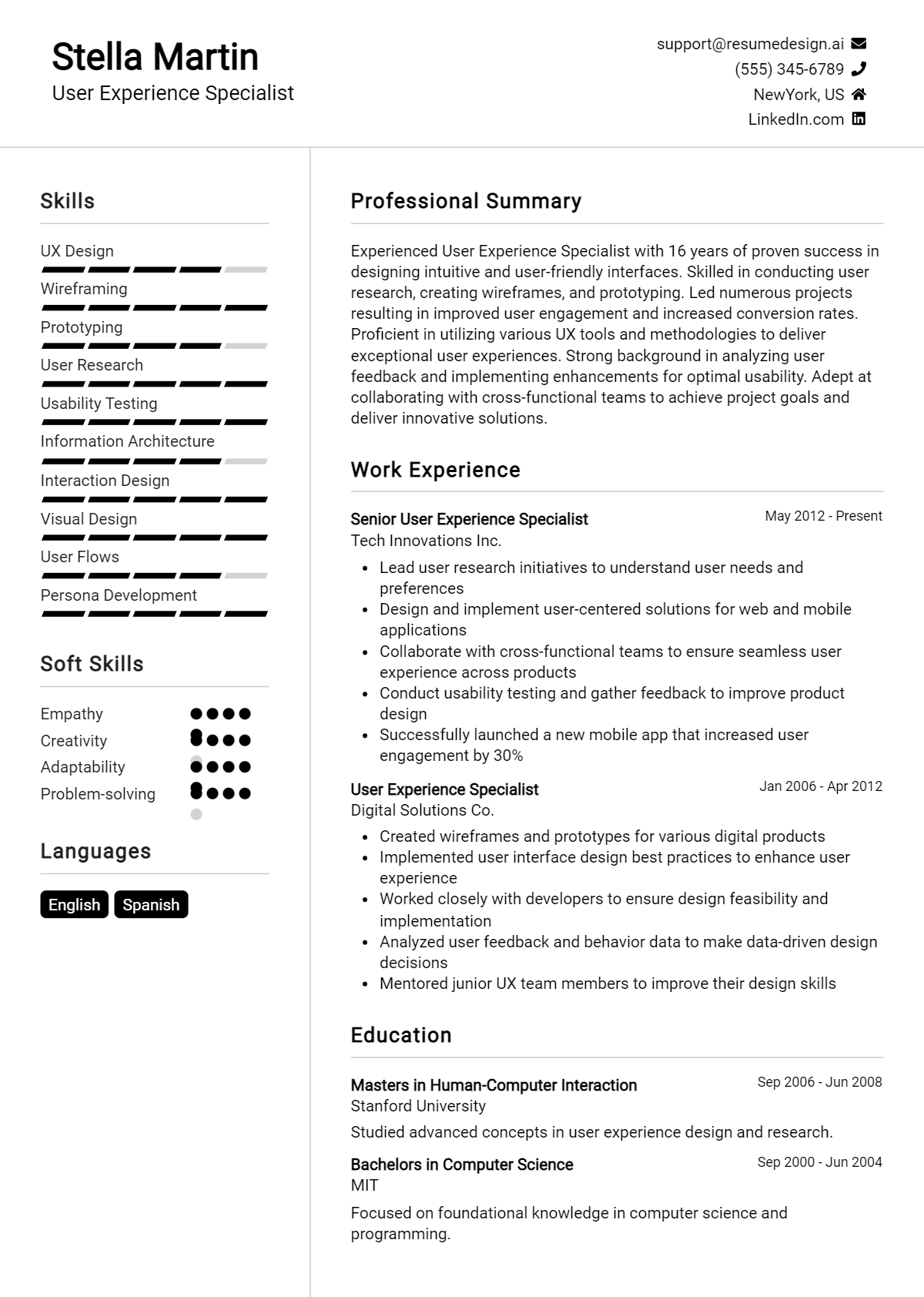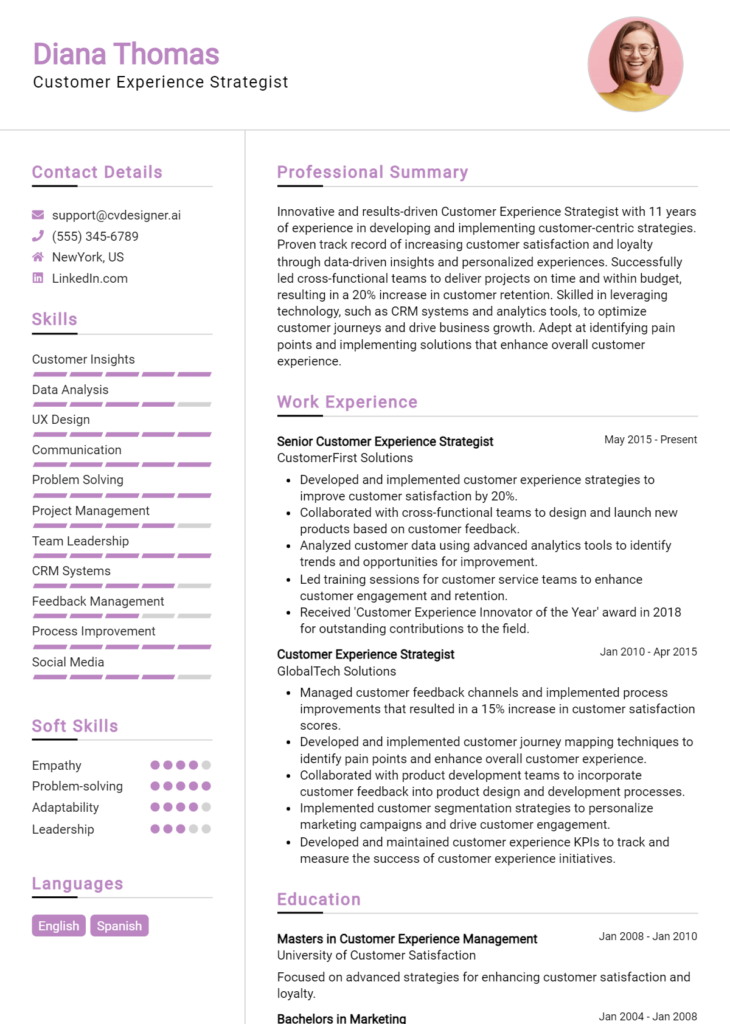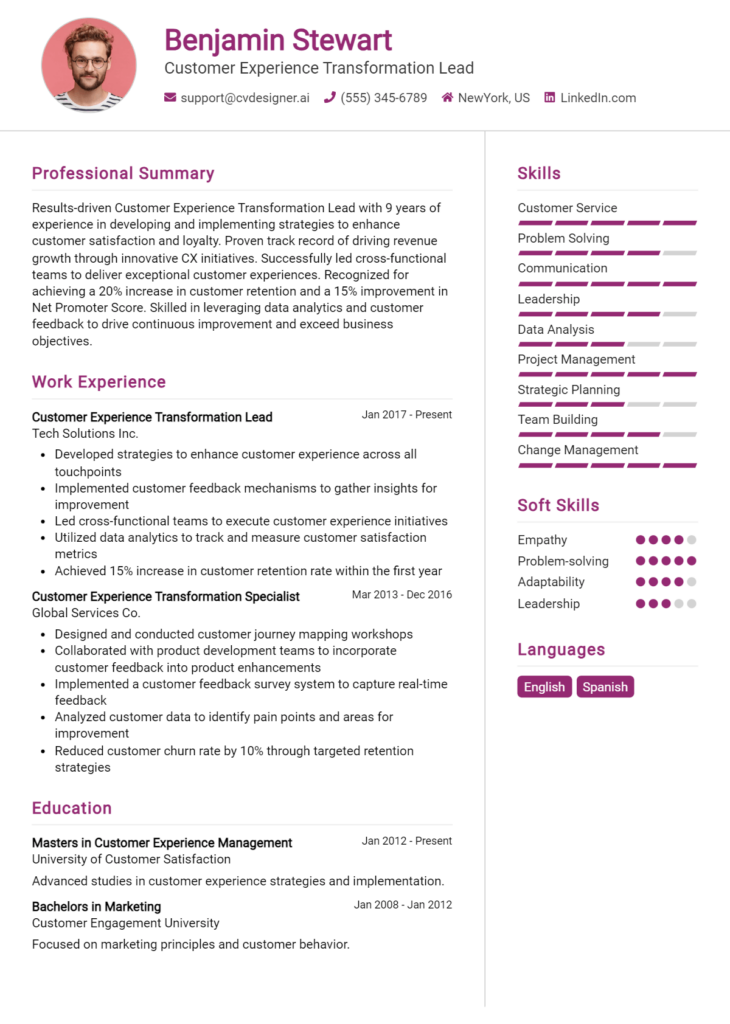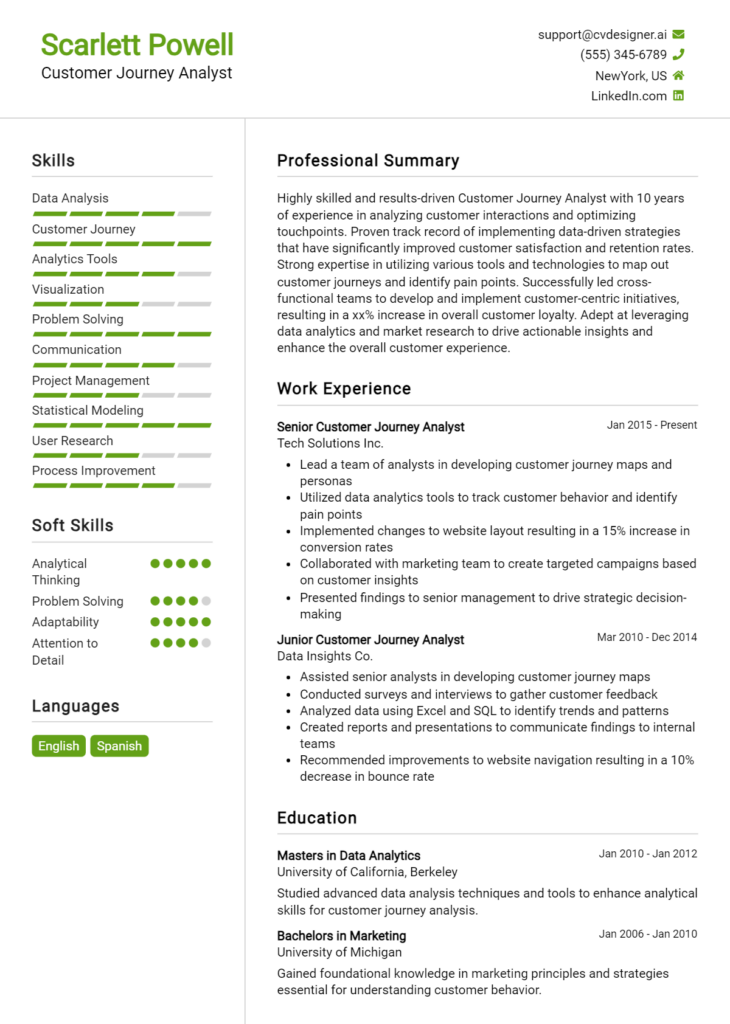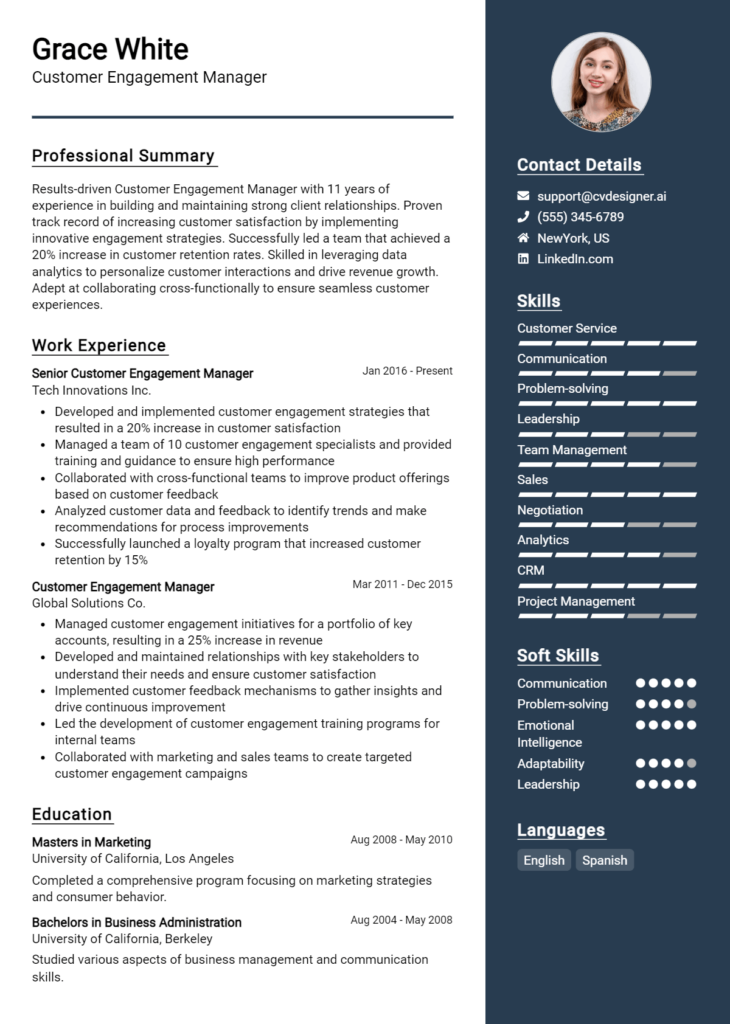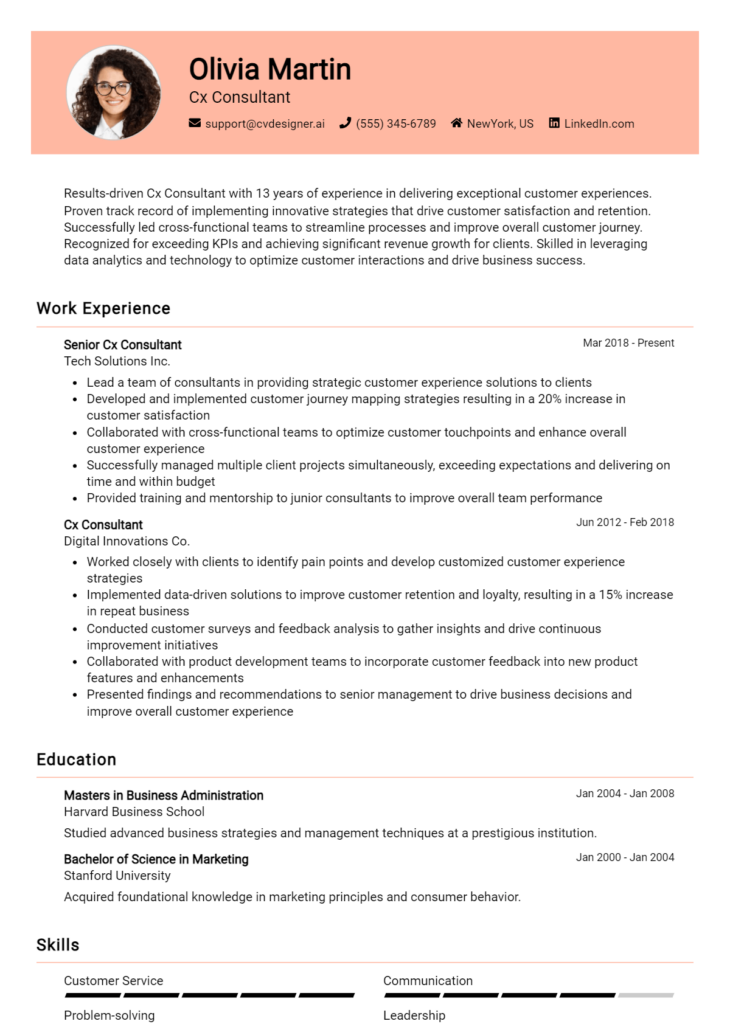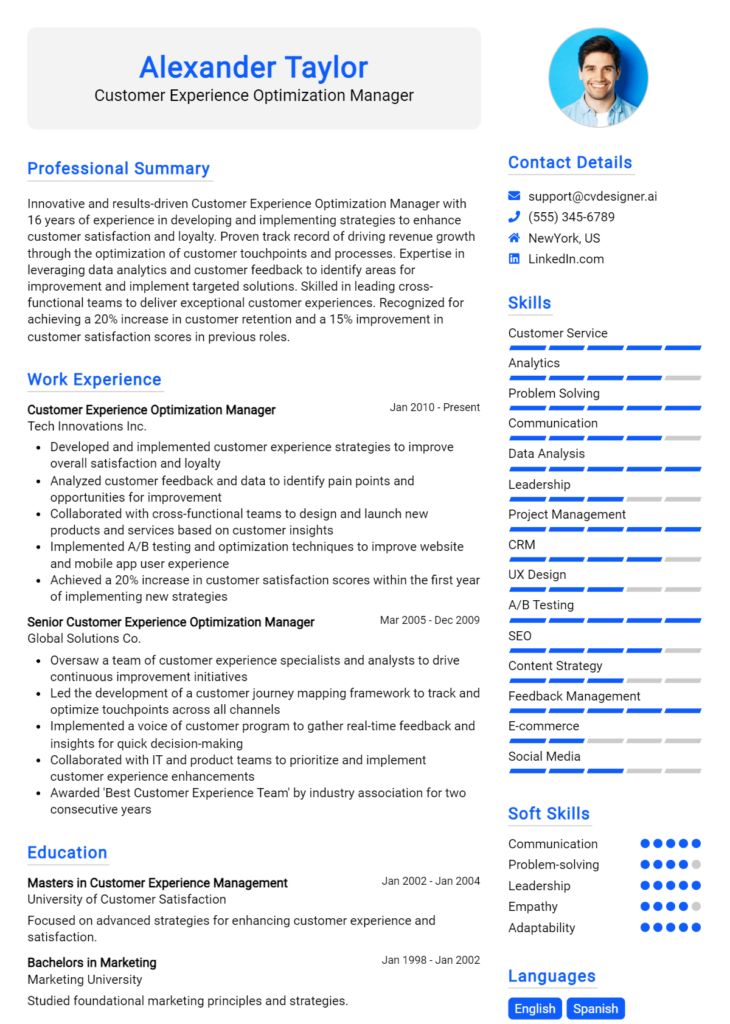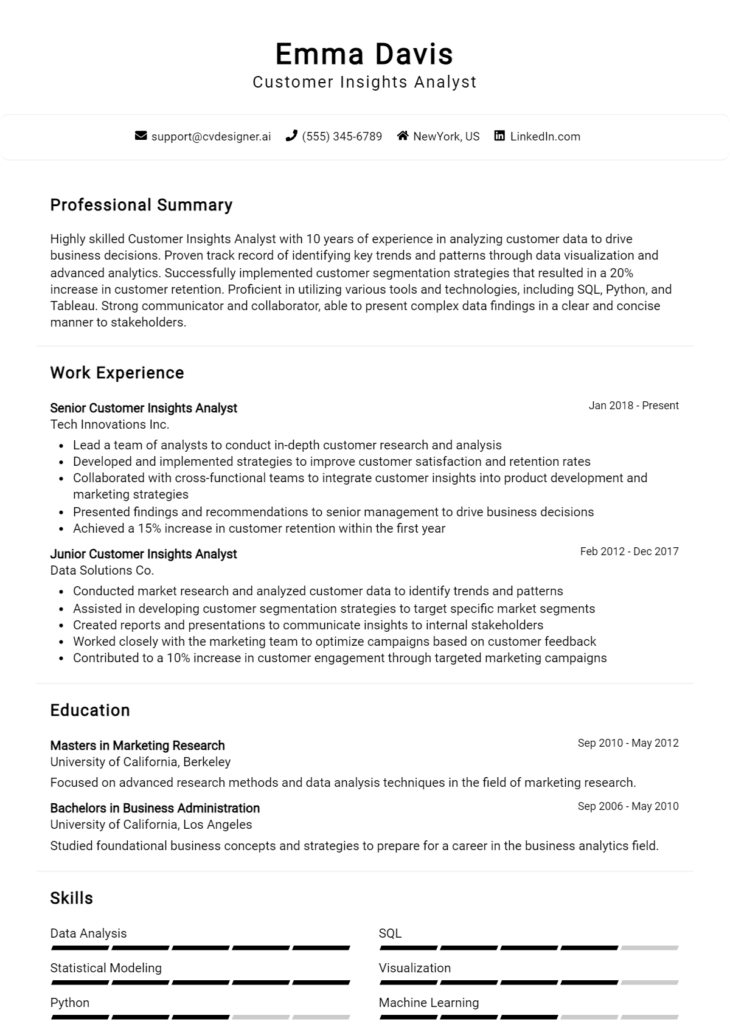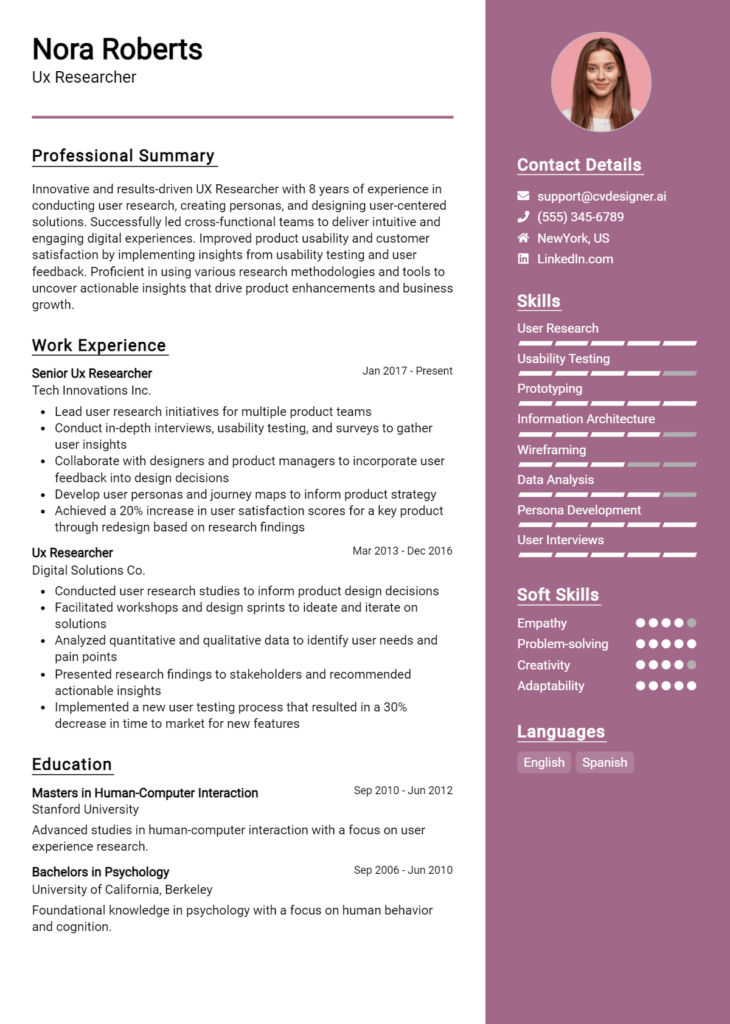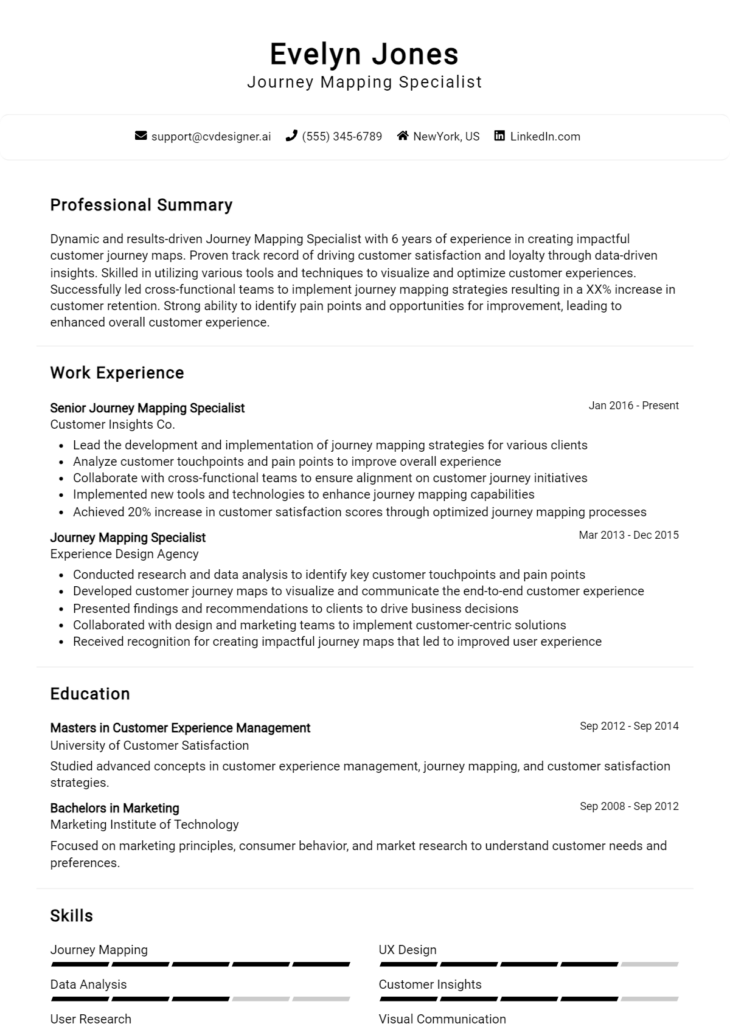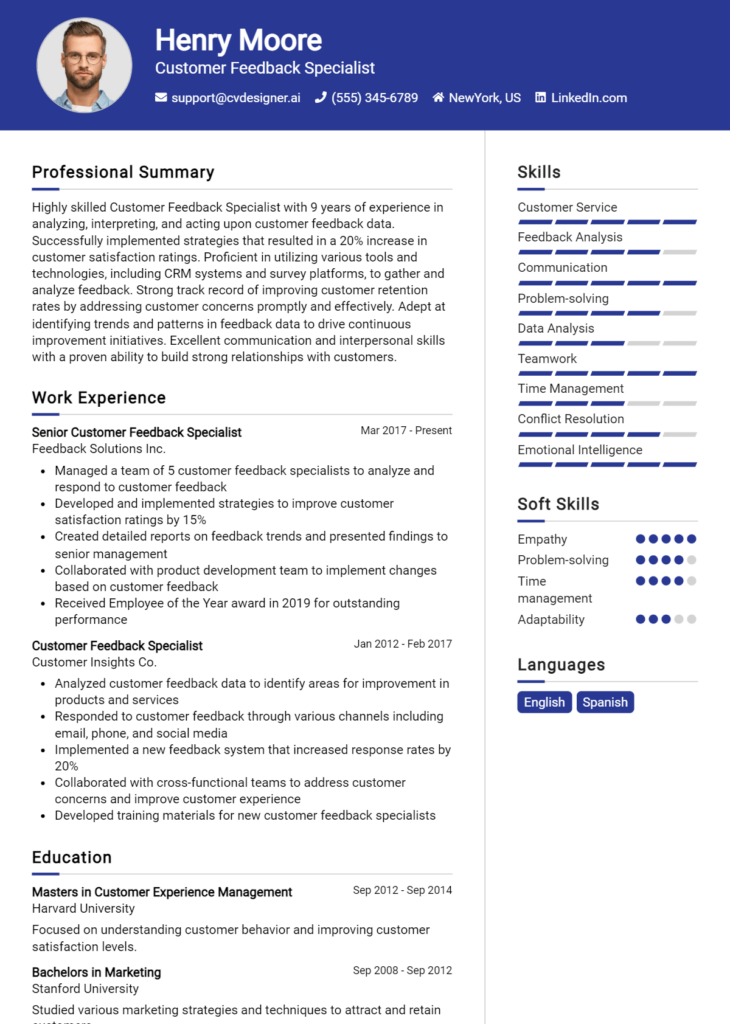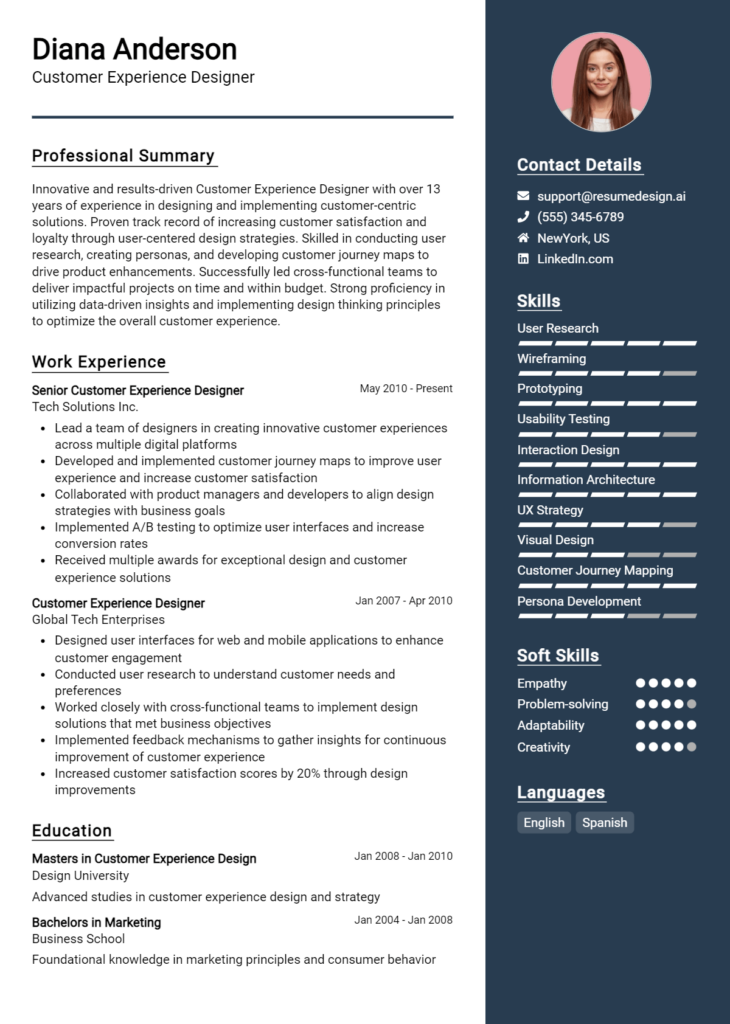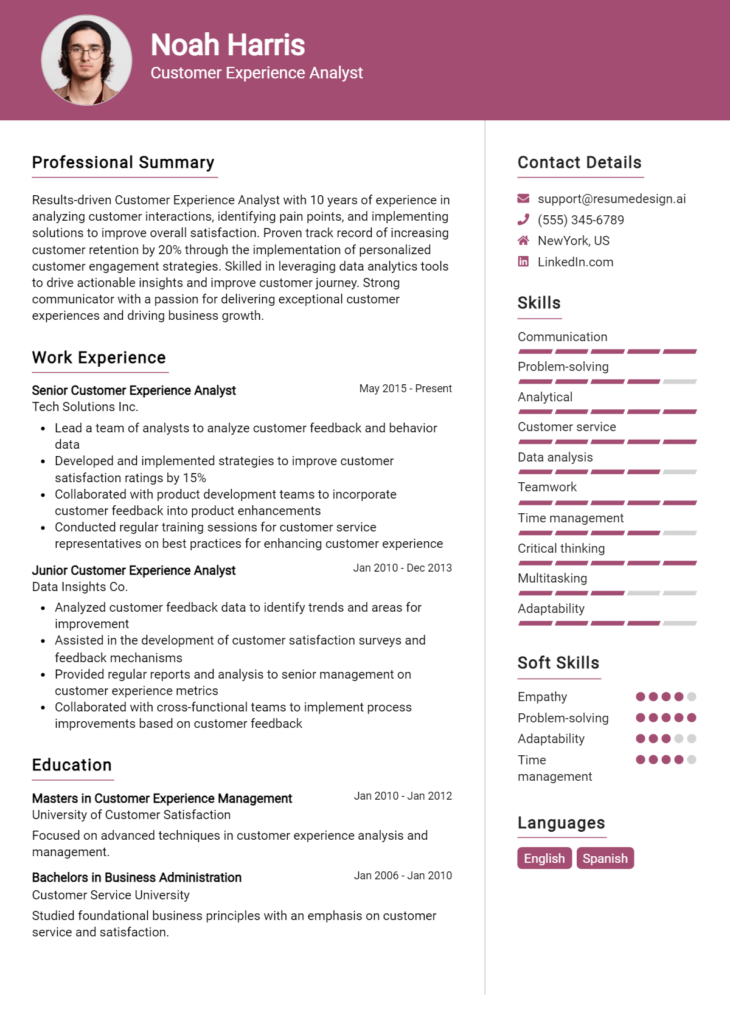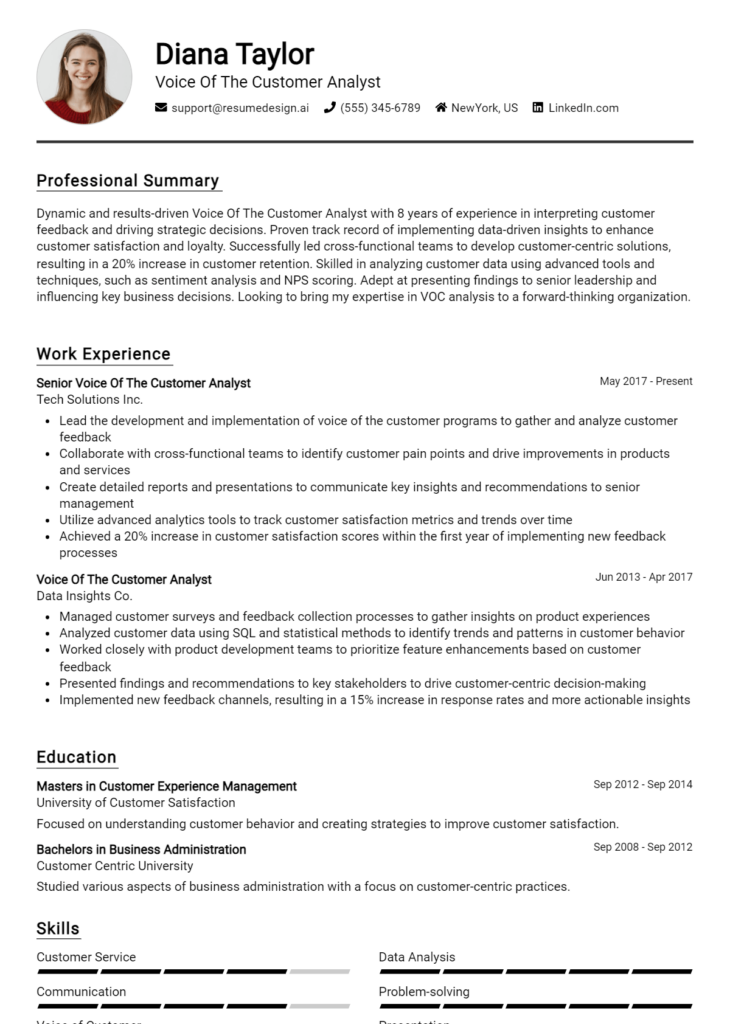User Experience Specialist Core Responsibilities
A User Experience Specialist plays a pivotal role in enhancing product usability by bridging departments such as design, development, and marketing. This professional is responsible for conducting user research, creating wireframes, and testing prototypes to ensure a seamless user journey. Essential skills include strong analytical abilities, technical proficiency, and problem-solving skills, which contribute to achieving organizational goals by improving customer satisfaction. A well-structured resume effectively highlights these qualifications, showcasing the candidate's impact on user experience.
Common Responsibilities Listed on User Experience Specialist Resume
- Conduct user research and usability testing to gather insights
- Create wireframes, prototypes, and user journey maps
- Collaborate with cross-functional teams to align on design strategies
- Analyze user feedback and iterate designs accordingly
- Develop and maintain design guidelines and standards
- Utilize analytics tools to track user behavior and engagement
- Present findings and recommendations to stakeholders
- Stay updated on industry trends and best practices
- Facilitate workshops and brainstorming sessions to generate ideas
- Assist in the development of user personas and scenarios
High-Level Resume Tips for User Experience Specialist Professionals
A well-crafted resume is crucial for User Experience Specialist professionals, serving as the first impression they make on potential employers. In a field where design, user interaction, and problem-solving are paramount, your resume must go beyond listing job titles; it should effectively reflect your unique skills, achievements, and understanding of user-centered design principles. This guide will provide practical and actionable resume tips specifically tailored for User Experience Specialist professionals, ensuring your application stands out in a competitive job market.
Top Resume Tips for User Experience Specialist Professionals
- Tailor your resume to each job description by incorporating relevant keywords and skills that align with the specific requirements of the role.
- Showcase relevant experience by highlighting projects that demonstrate your expertise in user research, wireframing, prototyping, and usability testing.
- Quantify achievements wherever possible, using metrics to illustrate the impact of your work on user satisfaction, conversion rates, or project efficiency.
- Highlight industry-specific skills, such as proficiency in design software (e.g., Sketch, Figma) and familiarity with front-end development languages (e.g., HTML, CSS).
- Include a portfolio link that showcases your best work, allowing potential employers to see your design process and outcomes firsthand.
- Focus on the user-centered design process by explaining your role in understanding user needs and how you applied insights to improve products.
- Utilize a clean and organized layout, using white space effectively to enhance readability and make the document visually appealing.
- Incorporate testimonials or endorsements from colleagues or clients that highlight your collaborative skills and design thinking approach.
- Keep your resume concise, ideally one page, ensuring only the most relevant information is included to maintain the reader's attention.
Implementing these tips can significantly increase your chances of landing a job in the User Experience Specialist field. By presenting a polished and targeted resume, you not only showcase your qualifications but also demonstrate your understanding of the principles of effective user experience design, making you a compelling candidate for potential employers.
Why Resume Headlines & Titles are Important for User Experience Specialist
In the competitive field of User Experience (UX) design, a well-crafted resume headline or title is essential for making a strong first impression. This crucial element of a resume serves as a succinct summary of a candidate's key qualifications and expertise, allowing hiring managers to quickly assess whether the applicant aligns with the needs of the role. A strong headline or title can capture attention immediately, enticing recruiters to delve deeper into the resume. It should be concise, relevant, and directly related to the specific UX position being applied for, ensuring that the candidate stands out among numerous applicants.
Best Practices for Crafting Resume Headlines for User Experience Specialist
- Keep it concise: Aim for one impactful phrase that captures your essence.
- Be role-specific: Tailor your headline to reflect the specific UX position you are applying for.
- Highlight key strengths: Focus on your most relevant skills or accomplishments.
- Use industry-relevant keywords: Incorporate terminology that resonates with UX professionals.
- Avoid jargon: Use clear language that can be easily understood by all hiring managers.
- Showcase results-oriented language: Emphasize your impact and contributions in previous roles.
- Be authentic: Ensure that your headline genuinely reflects your professional identity.
- Prioritize clarity: Make sure your headline clearly communicates your expertise and value.
Example Resume Headlines for User Experience Specialist
Strong Resume Headlines
"User Experience Specialist with 5+ Years in Creating Intuitive Interfaces"
“Passionate UX Designer Focused on Enhancing User Engagement and Satisfaction”
“Results-Driven UX Researcher with Expertise in Usability Testing and User Insights”
Weak Resume Headlines
“Experienced Professional”
“Seeking New Opportunities”
The strong headlines are effective because they provide specific information about the candidate's skills, experience, and focus areas, making it easy for hiring managers to understand their qualifications at a glance. In contrast, the weak headlines fail to impress as they are vague and generic, lacking the specificity that can differentiate a candidate in a crowded job market. By using compelling and relevant language, strong headlines can significantly increase the chances of a resume being noticed and considered for further review.
Writing an Exceptional User Experience Specialist Resume Summary
A resume summary is a crucial element for a User Experience Specialist as it serves as the first impression to hiring managers. This brief yet impactful section can quickly capture their attention by highlighting the candidate's key skills, relevant experience, and notable accomplishments in the realm of user experience design. A well-crafted summary should be concise, compelling, and tailored specifically to the job being applied for, making it easier for employers to recognize the candidate's potential fit for their team and the value they can bring to the organization.
Best Practices for Writing a User Experience Specialist Resume Summary
- Quantify your achievements by including metrics or percentages to showcase your impact.
- Focus on the most relevant skills, such as usability testing, user research, and interface design.
- Tailor your summary to match the job description and emphasize keywords used in the posting.
- Use action verbs to convey energy and initiative, such as "designed," "implemented," or "analyzed."
- Highlight your experience with specific tools and methodologies pertinent to user experience.
- Keep it concise, ideally between 3-5 sentences, focusing on your most impressive qualifications.
- Showcase any industry-specific knowledge or certifications that enhance your credibility.
- Maintain a professional tone while infusing a bit of your personality to stand out.
Example User Experience Specialist Resume Summaries
Strong Resume Summaries
Detail-oriented User Experience Specialist with over 5 years of experience in creating user-centered designs, achieving a 30% increase in user satisfaction scores through iterative testing and feedback analysis.
Dynamic UX Designer skilled in wireframing and prototyping, with a proven track record of enhancing app usability by 40%, resulting in a 25% increase in user retention rates.
Innovative UX Researcher with a strong background in user testing and data analysis, successfully leading projects that improved overall product accessibility ratings by 50%, earning a UX Excellence Award.
Results-driven User Experience Specialist with expertise in interaction design and user journey mapping, contributing to a 15% reduction in user onboarding time through strategic redesigns.
Weak Resume Summaries
I am a User Experience Specialist with some experience in design and research.
Dedicated professional looking to apply my skills in a user experience role.
The strong resume summaries provided effectively showcase specific achievements and quantify results, making them impactful and relevant to the User Experience Specialist role. They highlight essential skills and demonstrate a clear connection to the job responsibilities. In contrast, the weak summaries lack specificity and measurable outcomes, making them too generic and less likely to capture the interest of hiring managers. Effective summaries should communicate clear value and demonstrate a candidate's unique qualifications for the position.
Work Experience Section for User Experience Specialist Resume
The work experience section of a User Experience Specialist resume is vital as it serves as a testament to the candidate's capabilities and accomplishments in the field. This section not only highlights the candidate's technical skills in areas such as usability testing, user research, and design principles but also demonstrates their ability to effectively manage teams and deliver high-quality products that enhance user satisfaction. By quantifying achievements and aligning experience with industry standards, candidates can provide concrete evidence of their expertise and value, making a compelling case to potential employers.
Best Practices for User Experience Specialist Work Experience
- Begin each bullet point with strong action verbs to convey impact.
- Quantify achievements with metrics, such as percentage improvements in user engagement or reduced project timelines.
- Highlight relevant technical skills, such as proficiency in design tools (e.g., Sketch, Figma) or methodologies (e.g., Agile, Design Thinking).
- Emphasize collaboration by detailing experiences working with cross-functional teams, such as developers and product managers.
- Include specific examples of user research or usability testing that led to actionable insights.
- Align experiences with the job description to demonstrate relevance to the role.
- Showcase leadership responsibilities, such as mentoring junior team members or leading design workshops.
- Reflect on challenges faced and how they were overcome, showcasing problem-solving skills.
Example Work Experiences for User Experience Specialist
Strong Experiences
- Led a team of 5 in redesigning a mobile app, resulting in a 30% increase in user retention and a 25% reduction in customer support tickets.
- Conducted user research that informed the development of a new feature, increasing user engagement by 40% within three months of launch.
- Implemented a new usability testing framework that decreased testing time by 20% while improving participant satisfaction ratings by 15%.
- Collaborated with product and development teams to deliver an innovative web interface that enhanced user experience, receiving an award for best design at the annual industry conference.
Weak Experiences
- Worked on various projects related to user experience.
- Participated in team meetings to discuss design ideas.
- Assisted in user testing sessions without specific outcomes.
- Contributed to a project that was focused on improving user experience.
The examples listed above illustrate the difference between strong and weak experiences. Strong experiences provide specific, quantifiable outcomes and demonstrate a clear impact on user experience, showcasing both technical expertise and collaboration. In contrast, weak experiences lack detail and measurable results, making them less impressive and failing to illustrate the candidate's true capabilities in the field of user experience design.
Education and Certifications Section for User Experience Specialist Resume
The education and certifications section of a User Experience Specialist resume is crucial as it serves to showcase the candidate's academic background, relevant industry certifications, and commitment to continuous learning. This section not only reflects the foundational knowledge gained through formal education but also emphasizes the candidate's dedication to staying updated with the latest trends and methodologies in user experience design. By including relevant coursework, certifications, and specialized training, candidates can greatly enhance their credibility, demonstrating their alignment with the requirements of the job role and their readiness to contribute effectively to the organization.
Best Practices for User Experience Specialist Education and Certifications
- Prioritize relevant degrees such as User Experience Design, Human-Computer Interaction, or Graphic Design.
- Include industry-recognized certifications like Certified Usability Analyst (CUA) or Nielsen Norman Group UX Certification.
- List specific coursework that relates directly to user experience, such as Interaction Design, Usability Testing, or Information Architecture.
- Highlight any specialized training in software tools commonly used in UX, such as Sketch, Adobe XD, or Figma.
- Provide a chronological list of certifications with the date obtained to show ongoing professional development.
- Avoid listing outdated qualifications or degrees that do not pertain to the UX field.
- Include any relevant workshops or seminars attended to illustrate proactive learning efforts.
- Be concise yet detailed enough to convey the importance and relevance of each qualification.
Example Education and Certifications for User Experience Specialist
Strong Examples
- Bachelor of Arts in User Experience Design, University of California, 2021
- Certified Usability Analyst (CUA), Human Factors International, 2022
- Advanced Certificate in Human-Computer Interaction, Stanford University, 2023
- Coursework in Interaction Design and Usability Testing, UX Design Bootcamp, 2020
Weak Examples
- Bachelor of Science in Business Administration, 2010
- Certificate in Basic Computer Skills, Local Community College, 2015
- Diploma in Graphic Design, 2008 (not focused on UX)
- Certification in Microsoft Office Suite, 2016
The strong examples are considered effective because they are directly relevant to the field of user experience, showcasing specialized knowledge and qualifications that align with the role. In contrast, the weak examples reflect outdated or unrelated qualifications that do not contribute to a candidate's suitability for a User Experience Specialist position, demonstrating a lack of focus on the necessary skills and knowledge required in the field.
Top Skills & Keywords for User Experience Specialist Resume
In the competitive field of user experience (UX) design, a well-crafted resume is essential for standing out among candidates. Highlighting the right skills is crucial, as they serve as the foundation for demonstrating your expertise and suitability for the role of a User Experience Specialist. Employers look for a mix of hard and soft skills that not only showcase your technical abilities but also your capacity to collaborate, empathize with users, and solve complex problems. A strong emphasis on skills in your resume can significantly enhance your chances of landing an interview and ultimately securing the position.
Top Hard & Soft Skills for User Experience Specialist
Soft Skills
- Empathy
- Communication
- Collaboration
- Problem-solving
- Critical thinking
- Adaptability
- Attention to detail
- Creativity
- Time management
- User advocacy
- Active listening
- Conflict resolution
- Open-mindedness
- Teamwork
- Cultural awareness
Hard Skills
- User research methodologies
- Wireframing and prototyping
- Usability testing
- Interaction design
- Information architecture
- Visual design principles
- UX writing
- User journey mapping
- Design software proficiency (e.g., Sketch, Figma, Adobe XD)
- HTML/CSS basics
- Accessibility standards (WCAG)
- Analytics tools (e.g., Google Analytics)
- A/B testing
- User persona development
- Customer experience optimization
By integrating these skills into your resume, along with showcasing your relevant work experience, you'll be well on your way to impressing potential employers and demonstrating your capability as a User Experience Specialist.
Stand Out with a Winning User Experience Specialist Cover Letter
As a passionate User Experience Specialist with over five years of experience in designing intuitive and engaging digital experiences, I am excited to apply for the position at your esteemed company. My background in human-centered design, coupled with my ability to analyze user behavior through data-driven insights, has equipped me with the skills necessary to create user-friendly interfaces that not only meet business goals but also delight users. I am particularly drawn to your organization because of its commitment to innovation and user satisfaction, and I am eager to contribute my expertise to your team.
In my previous role at XYZ Company, I successfully led a cross-functional team in redesigning the company’s flagship product, resulting in a 30% increase in user engagement and a significant reduction in customer support queries. By conducting extensive user research, including surveys and usability testing, I was able to identify pain points and develop solutions that enhanced the overall user experience. My proficiency in tools such as Sketch, Figma, and Adobe XD allows me to create high-fidelity prototypes that effectively communicate design ideas to stakeholders, ensuring alignment and clarity throughout the development process.
I believe that collaboration is key to successful user experience design. Throughout my career, I have worked closely with developers, product managers, and marketing teams to ensure a cohesive vision and execution of projects. I am also an advocate for incorporating user feedback into the design process, which I believe is essential for creating products that resonate with users. I am excited about the opportunity to bring my collaborative spirit and innovative thinking to your team, helping to create exceptional digital experiences that drive user loyalty and satisfaction.
Thank you for considering my application. I am looking forward to the possibility of discussing how my skills and experiences align with the needs of your team. I am enthusiastic about the opportunity to contribute to your projects and help elevate the user experience at your organization. Please feel free to contact me at your earliest convenience to schedule a conversation.
Common Mistakes to Avoid in a User Experience Specialist Resume
When crafting a resume for a User Experience Specialist position, it's essential to present your skills and experiences effectively. However, many candidates make common mistakes that can hinder their chances of landing an interview. By avoiding these pitfalls, you can create a more compelling resume that highlights your qualifications and understanding of user-centered design principles. Here are some common mistakes to watch out for:
Vague Job Descriptions: Failing to provide specific details about previous roles can leave hiring managers questioning your actual responsibilities and achievements. Use quantifiable metrics and concrete examples to illustrate your impact.
Ignoring UX Principles: Not showcasing your knowledge of user experience methodologies, such as usability testing or user research, can suggest a lack of expertise. Make sure to highlight your familiarity with relevant UX frameworks.
Overloading with Jargon: While it's important to demonstrate your knowledge, excessive use of industry jargon can make your resume difficult to read. Strive for clarity and ensure that even non-specialists can understand your contributions.
Neglecting Design Skills: User Experience Specialists often require a blend of design and analytical skills. Omitting relevant design software experience or showcasing design projects can make your application less competitive.
Not Tailoring for the Role: Sending out a generic resume without customizing it for each job application can lead to missed opportunities. Tailor your resume to emphasize the skills and experiences that align with the specific job description.
Lack of User-Centric Language: A resume that doesn't speak to the user-centered approach of UX design may not resonate with potential employers. Use language that reflects your commitment to understanding and addressing user needs.
Forgetting Soft Skills: UX roles often require strong communication and collaboration skills. Failing to highlight these soft skills can give the impression that you are not a team player or cannot effectively engage with stakeholders.
Omitting Portfolio Links: A portfolio showcasing your work is crucial for a UX Specialist. Neglecting to include links to your portfolio or relevant case studies can leave your resume incomplete and diminish your chances of impressing hiring managers.
Conclusion
In summary, the role of a User Experience Specialist is crucial in shaping how users interact with products and services. Key responsibilities include conducting user research, creating wireframes and prototypes, and collaborating with cross-functional teams to ensure that user needs are met effectively. By focusing on usability, accessibility, and overall user satisfaction, UX Specialists play an integral part in driving product success.
As you reflect on your qualifications and experiences, it's an opportune moment to review your User Experience Specialist resume. Ensure it highlights your skills and achievements effectively to stand out in this competitive field. To aid you in this process, consider utilizing available resources such as resume templates, which can provide a professional layout; a resume builder, for a user-friendly way to craft your document; resume examples to inspire your content; and cover letter templates to complement your application.
Take action now to refine your resume and enhance your chances of landing that dream role as a User Experience Specialist!

